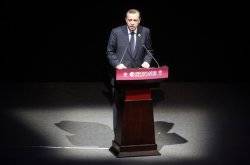Tayyip Erdogan, the Turkish prime minister, has rejected charges he sought to inflame sectarian divisions in Iraq and accused Iraqi Prime Minister Nuri al-Maliki of trying to gain "prestige", the latest in a series of bitter exchanges between the neighbors.
The Turkish PM comments on Saturday came just days after he had accused Nuri al-Maliki of being "self-centered" and inciting tensions between the country's Shias, Sunnis and Kurds amid a constitutional crisis in Baghdad.
Maliki, in response to Erdogan's comments on Thursday, branded Turkey a "hostile state" and said Erdogan's remarks "represent another return to flagrant interference in Iraqi internal affairs," according to a statement on his website on Friday.
"We don't differentiate between Sunnis or Shias. Arab, Kurd or Turkmen, they are all our brothers," Erdogan told reporters in comments reported by the NTV news channel.
"If we respond to Mr. Maliki, we give him the opportunity to show off there. There is no need to allow him to gain prestige."
Turkey, which is majority Sunni, has been seen as a key ally and even a role model for Iraq, because of its secular constitution and close relations with the West, including membership in NATO.
Iraq is Turkey's second largest trading partner after Germany, with trade reaching $12 billion last year, more than half of which was with the semi-autonomous Kurdistan region.
Interference
Baghdad has occasionally accused Ankara of meddling in its affairs since the 2003 US-led invasion. Saudi Arabia, Iran and Syria have also been accused of destabilizing their neighbor.
The bitter exchange between Maliki and Erdogan came after the Turkish leader met Masoud Barzani, president of the Kurdish region, who has cultivated close relations with Turkey's government.
Erdogan also met Iraq's Sunni vice president, Tareq al-Hashemi, who fled Iraq in December after a warrant for his arrest was issued, sparking the current political crisis in Baghdad.
Hashemi is wanted on charges he ran death squads. Turkey's Foreign Ministry weighed in on the dispute and issued a statement that said Turkey has no intention of interfering in Iraq or any other neighbor’s internal affairs.
"The foundation of the political crisis in which Iraq finds itself is that Iraqi politicians seek to consolidate power and exclude others, rather than (follow) politics that are based on democratic and universal principles," it said in a statement.
"It is a fact that behind the misperceptions that led to the accusations against Turkey by Prime Minister Maliki, who instigated the crisis in Iraq, this wrong understanding of politics can be found," it said.
As long as they present no obstacles, Turkey seeks friendly relations with its neighbors, the statement also said.
Erdogan previously has warned that Turkey would not remain silent if a sectarian conflict erupted in Iraq.
He is also a vocal critic of erstwhile ally Syrian President Bashar al-Assad' crackdown against a largely Sunni uprising.
Turkey is worried that the violence in Syria and growing tensions in Iraq could lead to a wider conflict between Shia and Sunni Muslims in the region.
Relations with Iran have also soured over Turkey's opposition toward Tehran's ally Assad
PHOTO CAPTION
Erdogan has warned that Turkey would not remain silent if a sectarian conflict erupted in Iraq [Reuters]
Aljazeera


 Home
Home Discover Islam
Discover Islam Quran Recitations
Quran Recitations Lectures
Lectures
 Fatwa
Fatwa Articles
Articles Fiqh
Fiqh E-Books
E-Books Boys & Girls
Boys & Girls  Women
Women










